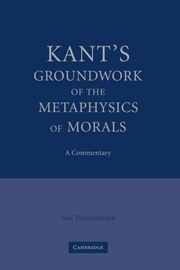Book contents
- Frontmatter
- Contents
- Acknowledgements
- Note on quotations from Kant's works
- Introduction
- Kant's Groundwork: synopsis of the argument
- Commentary
- Appendix A Schiller's scruples of conscience
- Appendix B The pervasiveness of morality
- Appendix C Universal legislation, ends and puzzle maxims
- Appendix D ‘Indirect duty’: Kantian consequentialism
- Appendix E Freedom and moral failure: Reinhold and Sidgwick
- Appendix F The project of a ‘metaphysics of morals’
- Glossary
- Bibliography
- Index
Appendix F - The project of a ‘metaphysics of morals’
Published online by Cambridge University Press: 24 February 2010
- Frontmatter
- Contents
- Acknowledgements
- Note on quotations from Kant's works
- Introduction
- Kant's Groundwork: synopsis of the argument
- Commentary
- Appendix A Schiller's scruples of conscience
- Appendix B The pervasiveness of morality
- Appendix C Universal legislation, ends and puzzle maxims
- Appendix D ‘Indirect duty’: Kantian consequentialism
- Appendix E Freedom and moral failure: Reinhold and Sidgwick
- Appendix F The project of a ‘metaphysics of morals’
- Glossary
- Bibliography
- Index
Summary
If the Groundwork is a foundational essay on moral philosophy, a preparatory text preceding a ‘Metaphysics of Morals’ proper and largely not even a preliminary sketch of this novel discipline, what would Kant's final ethical system look like? The answer is anything but straightforward. Kant had been planning to write a foundational treatise on moral philosophy since the mid-1760s, when his views were influenced by moral sense philosophy. He did not publish a ‘Metaphysics of Morals’ at the time, but it would undoubtedly have reflected his philosophical commitments. The project survives the changes of the 1770s and becomes part of the critical enterprise. For a while, there is no indication that a critical foundation of the metaphysics of morals other than the Critique of Pure Reason itself is required or even possible, but around 1783 Kant came to think that it needed some critical preparation after all – hence the Groundwork. The Critique of Practical Reason – which is curiously detached from the metaphysical project – followed in 1788. After finishing the third and final Critique Kant returned to the ‘Metaphysics of Morals’ in the early 1790s. He lectured on the topic in the winter semester of 1793–4, and a book called the Metaphysics of Morals was finally published, in two parts, in 1797.
It seems that for more than thirty years the title of a ‘Metaphysics of Morals’ was little more than a placeholder for a future systematic treatise on moral philosophy, while Kant's conception of the discipline, its foundations and its place within philosophy as a whole changed dramatically.
Information
- Type
- Chapter
- Information
- Kant's Groundwork of the Metaphysics of MoralsA Commentary, pp. 168 - 172Publisher: Cambridge University PressPrint publication year: 2007
